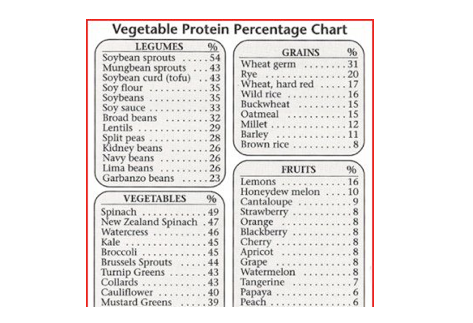It's Cliff Notes time again and this week he's talking protein. When we first started leaning into going veggie protein was a major topic of conversation. I LOVE this article, it left me with some major take-aways. I know it will for you too! :) Lacy
_______________________
Until recently, protein has gotten little attention. However, lately, high-protein diets for weight loss have gained momentum and people are starting to ask about it. The Institute of Medicine recommends that adults get a minimum of 0.8 grams of protein for every kilogram of body weight per day to keep from slowly breaking down their own tissues. That's just about 8 grams of protein for every 20 pounds of body weight.
Animal protein and vegetable protein probably have the same effects on health. A 6-ounce broiled porterhouse steak is a great source of complete protein—about 40 grams worth. But it also has about 38 grams of fat, 14 of them saturated. That's more than 60 percent of the recommended daily intake for saturated fat. The same amount of salmon gives you 34 grams of protein and 18 grams of fat, 4 of them saturated. A cup of cooked lentils has 18 grams of protein, but less than 1 gram of fat. The bottom line is that it's important to pay attention to what comes along with the protein in your food choices. Vegetable sources of protein, such as beans, nuts, and whole grains, are excellent choices, and they offer healthy fiber, vitamins, and minerals. Nuts are also a great source of healthy fat (http://www.hsph.harvard.edu/nutritionsource).
The best animal protein choices are fish and poultry. If you are partial to red meat, such as beef, pork, or lamb, stick with the leanest cuts, choose moderate portion sizes, and make it only an occasional part of your diet, for several reasons: Research suggests that people who eat even modest amounts of red meat have a higher risk of developing colon cancer, heart disease, and diabetes, and a higher risk of dying from heart disease, cancer, or any cause. And skip the processed stuff like bacon, hot dogs, and deli meats since that's linked even more strongly to cancer, heart disease, and diabetes risk. (Processed meats are very high in sodium, which may be one reason why they are associated with higher disease risks.)
What is protein?
Protein is found throughout the body in muscle, bone, skin, hair, and virtually every other body part or tissue. It makes up the enzymes that power many chemical reactions and the hemoglobin that carries oxygen in your blood. At least 10,000 different proteins make you what you are and keep you that way. Twenty or so basic building blocks, called amino acids, provide the raw material for all proteins. And just for clarity, amino acids rebuild the body while vitamins make it function better.
Following genetic instructions, the body strings together amino acids. Some genes call for short chains of amino acids; others are blueprints for long chains that fold, origami-like, into intricate, three-dimensional structures. Because the body doesn't store amino acids, as it does fats or carbohydrates, it needs a daily supply of amino acids to make new protein.
One protein source that has been getting a lot of attention is soybeans. We've been told that regularly eating soy-based foods lowers cholesterol, chills hot flashes, prevents breast and prostate cancer, aids weight loss, and wards off osteoporosis. Some of these benefits have been attributed to a unique characteristic of soybeans which is their high concentration of isoflavones, a type of plant-made estrogen (phytoestrogen). The claim was based on early research showing that soy protein lowered levels of LDL (bad) cholesterol. A number of solid studies done since then have questioned this finding.
However, soybean and egg protein is a "complete protein" since they each provide all of the essential amino acids for human nutrition (http://www.wikipedia.org/), (http://www.nsrl.uiuc.edu/soy_benefits.html).
a note from Lacy on soy: If you're going to do soy the best way to get it into your diet is through edamame or fermented soy like in Miso soup. Be careful of highly processed soy products! Much of the soy out there is HUGELY genetically modified and GMO is a NO GO!
Essential vs. non-essential (conditionally essential) amino acids:
The amino acids regarded as essential for humans are phenylalanine, valine, threonine, tryptophan, isoleucine, methionine, leucine, lysine, and histidine.
The amino acids arginine, cysteine, glycine, glutamine, histidine, proline, serine and tyrosine are considered conditionally essential.

